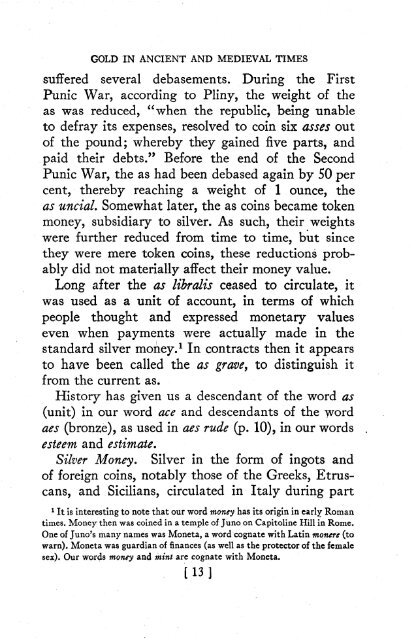You also want an ePaper? Increase the reach of your titles
YUMPU automatically turns print PDFs into web optimized ePapers that Google loves.
GOLD IN ANCIENT AND MEDIEVAL TIMES<br />
suffered several debasements. During <strong>the</strong> First<br />
Punic War, according to Pliny, <strong>the</strong> weight of <strong>the</strong><br />
as was .reduced, "when <strong>the</strong> republic, being unable<br />
to defray its expenses, resolved to coin six asses out<br />
of <strong>the</strong> pound; whereby <strong>the</strong>y gained five parts, <strong>and</strong><br />
paid <strong>the</strong>ir debts." Before <strong>the</strong> end of <strong>the</strong> Second<br />
Punic War, <strong>the</strong> as had been debased again by 50 per<br />
cent, <strong>the</strong>reby reaching a weight of 1 ounce, <strong>the</strong><br />
as uncial. Somewhat later, <strong>the</strong> as coins became token<br />
money, subsidiary to silver. As such, <strong>the</strong>ir weights<br />
were fur<strong>the</strong>r reduced from time to time, but since<br />
<strong>the</strong>y were mere token coins, <strong>the</strong>se reductions probably<br />
did not materially affect <strong>the</strong>ir money value.<br />
Long after <strong>the</strong> as libralis ceased to circulate, it<br />
was used asa unit of account, in terms of which<br />
people thought <strong>and</strong> expressed monetary values<br />
even when payments were actually made in <strong>the</strong><br />
st<strong>and</strong>ard silver money.! In contracts <strong>the</strong>n it appears<br />
to have been called <strong>the</strong> as grave, to distinguish it<br />
from <strong>the</strong> current as.<br />
History has given us a descendant of <strong>the</strong> word as<br />
(unit) in our word ace <strong>and</strong> descendants of <strong>the</strong> word<br />
aes (bronze), as used in aes rude (p. 10), in our words .<br />
esteem <strong>and</strong> estimate.<br />
Sih'er Money. Silver in <strong>the</strong> form of ingots <strong>and</strong><br />
of foreign coins, notably those of <strong>the</strong> Greeks, Etruscans,<br />
<strong>and</strong> Sicilians, circulated in Italy during part<br />
1 It is interesting to note that our word money has its origin in early Roman<br />
times. Money <strong>the</strong>n was coined in a temple oiJuno on Capitoline Hill {n Rome.<br />
One of Juno's many names was Moneta, a word cognate with Latin monere (to<br />
warn). Moneta was guardian of finances (as well as <strong>the</strong> protector of <strong>the</strong> female<br />
sex). Our wor4s monty <strong>and</strong> mint are cognate with Moneta.<br />
[ 13 ]

















